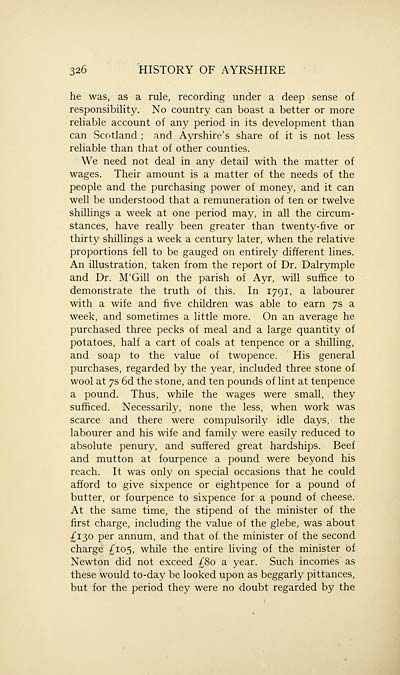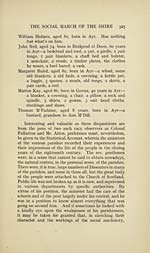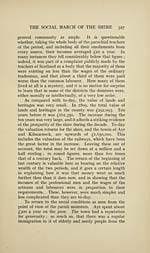Download files
Complete book:
Individual page:
Thumbnail gallery: Grid view | List view

326 HISTORY OF AYRSHIRE
he was, as a rule, recording under a deep sense of
responsibility. No country can boast a better or more
reliable account of any period in its development than
can Scotland ; and Ayrshire's share of it is not less
reliable than that of other counties.
We need not deal in any detail with the matter of
wages. Their amount is a matter of the needs of the
people and the purchasing power of money, and it can
well be understood that a remuneration of ten or twelve
shillings a week at one period may, in all the circum-
stances, have really been greater than twenty-five or
thirty shillings a week a century later, when the relative
proportions fell to be gauged on entirely different lines.
An illustration, taken from the report of Dr. Dalrymple
and Dr. M'Gill on the parish of Ayr, will suffice to
demonstrate the truth of this. In 1791, a labourer
with a wife and five children was able to earn 7s a
week, and sometimes a little more. On an average he
purchased three pecks of meal and a large quantity of
potatoes, half a cart of coals at tenpence or a shilling,
and soap to the value of twopence. His general
purchases, regarded by the year, included three stone of
wool at 7s 6d the stone, and ten pounds of lint at tenpence
a pound. Thus, while the wages were small, they
sufficed. Necessarily, none the less, when work was
scarce and there were compulsorily idle days, the
labourer and his wife and family were easily reduced to
absolute penury, and suffered great hardships. Beef
and mutton at fourpence a pound were beyond his
reach. It was only on special occasions that he could
afford to give sixpence or eightpence for a pound of
butter, or fourpence to sixpence for a pound of cheese.
At the same time, the stipend of the minister of the
first charge, including the value of the glebe, was about
£130 per annum, and that of the minister of the second
charge £105, while the entire living of the minister of
Newton did not exceed £80 a year. Such incomes' as
these would to-day be looked upon as beggarly pittances,
but for the period they were no doubt regarded by the
he was, as a rule, recording under a deep sense of
responsibility. No country can boast a better or more
reliable account of any period in its development than
can Scotland ; and Ayrshire's share of it is not less
reliable than that of other counties.
We need not deal in any detail with the matter of
wages. Their amount is a matter of the needs of the
people and the purchasing power of money, and it can
well be understood that a remuneration of ten or twelve
shillings a week at one period may, in all the circum-
stances, have really been greater than twenty-five or
thirty shillings a week a century later, when the relative
proportions fell to be gauged on entirely different lines.
An illustration, taken from the report of Dr. Dalrymple
and Dr. M'Gill on the parish of Ayr, will suffice to
demonstrate the truth of this. In 1791, a labourer
with a wife and five children was able to earn 7s a
week, and sometimes a little more. On an average he
purchased three pecks of meal and a large quantity of
potatoes, half a cart of coals at tenpence or a shilling,
and soap to the value of twopence. His general
purchases, regarded by the year, included three stone of
wool at 7s 6d the stone, and ten pounds of lint at tenpence
a pound. Thus, while the wages were small, they
sufficed. Necessarily, none the less, when work was
scarce and there were compulsorily idle days, the
labourer and his wife and family were easily reduced to
absolute penury, and suffered great hardships. Beef
and mutton at fourpence a pound were beyond his
reach. It was only on special occasions that he could
afford to give sixpence or eightpence for a pound of
butter, or fourpence to sixpence for a pound of cheese.
At the same time, the stipend of the minister of the
first charge, including the value of the glebe, was about
£130 per annum, and that of the minister of the second
charge £105, while the entire living of the minister of
Newton did not exceed £80 a year. Such incomes' as
these would to-day be looked upon as beggarly pittances,
but for the period they were no doubt regarded by the
Set display mode to:
![]() Universal Viewer |
Universal Viewer | ![]() Mirador |
Large image | Transcription
Mirador |
Large image | Transcription
Images and transcriptions on this page, including medium image downloads, may be used under the Creative Commons Attribution 4.0 International Licence unless otherwise stated. ![]()
| Histories of Scottish families > Ayrshire > Volume 1 > (336) Page 326 |
|---|
| Permanent URL | https://digital.nls.uk/95198318 |
|---|
| Attribution and copyright: |
|
|---|
| Description | A selection of almost 400 printed items relating to the history of Scottish families, mostly dating from the 19th and early 20th centuries. Includes memoirs, genealogies and clan histories, with a few produced by emigrant families. The earliest family history goes back to AD 916. |
|---|

